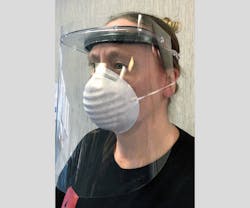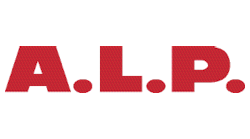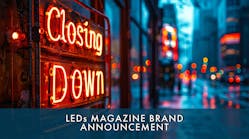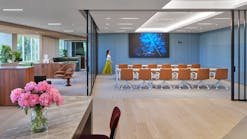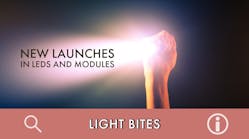Coronavirus: Signify reopens China plants. US lighting and plastics firm retools for PPE
Although Signify has withdrawn its financial guidance for 2020 amid the coronavirus pandemic, a wisp of normalcy has emerged as the company disclosed on its website that it has reopened its factories in China, the country where the outbreak began in December.
“Production at our locations in China has started again, and shipments outside of China have occurred, and good progress is made in transportation,” Signify posted on a page dedicated to coronavirus updates. “Given the ongoing situation, we won’t be able to provide more specific guidance at this point in time.”
The shutdowns had dated back to early February when the Chinese government ordered closures. The company has nine production facilities in the country, all of which are now running, a Signify spokesperson told LEDs Magazine.
“We gradually restarted production at the end of February,” the spokesperson said. “Given the high level of global uncertainty and the very limited visibility on how this crisis might unfold, we continuously assess the situation and adapt accordingly.”
The nine factories are in Shanghai, Xiamen, Yizheng, Chengdu, Shenzhen, Foshan, Ningbo and Haining, which has two factories. None are in Hubei, the province where the virus first spread, and which itself has now eased restrictions on business and movement.
As of last July, Signify had 40 factories around the world. That number has increased slightly with the acquisition of China’s Zhejiang Klite Lighting Holdings Co., Ltd. and of Eaton’s Cooper Lighting Solutions. Signify declined to provide an update on the status of all its factories.
Another European lighting company, Brussels-based Schréder Group, is also reporting that its production is running in China, as well as in Ukraine, while it has shuttered factories in four European countries and in South Africa.
“On 19th March, due to the rapidly changing situation in all countries, to minimize health risks and to help local authorities stop the spread of COVID-19, we decided to temporarily suspend production at four of our European factories, namely Spain, France, Hungary, and Portugal, until 5th April,” Schréder said in a statement last week.
“Yesterday, 25th March, following the decision of the South African President to impose a national lockdown from 27th March to 16th April, we suspended production at our factory based in Olifantsfontein from 27th March to 17th April 2020.”
The company said that is organizing its supply chain to be in full swing when factories reopen.
At the same time, “Our factories in China and Ukraine will remain operational,” Schréder noted. “We will continue to monitor the ongoing developments and will re-evaluate our plans accordingly.”
In another move, San Jose, CA-based LED maker Lumileds yesterday alerted customers that it is increasing prices by 4% starting Apr. 15 as a means to offset costs it has incurred during the coronavirus pandemic.
The price increase echoed a similar alert that industry leader Signify sent to US customers about three weeks ago. Signify’s 3% increase takes effect today.
Since that time, Signify has withdrawn its financial outlook for 2020. Industry number-two Osram had already done so earlier in March.
Elsewhere on the COVID-19 front, Niles, IL-based A.L.P. Lighting Components has retooled production at a Michigan factory in order to manufacture a face shield it has designed to sell as personal protection equipment in the health field. A.L.P. is also a thermoplastics maker specializing in injection and compression molding.
“Joining the fight against the COVID-19 pandemic, the injection molding team at A.L.P. LexaLite’s Charlevoix, MI facility mobilized to design and manufacture personal protective equipment (PPE) face shields for front-line health care workers,” the company said yesterday in a press release. “They rapidly reorganized tooling and manufacturing functions to support this critical need, and they expect to have the first production models coming off the presses within days.”
A.L.P. took up the initiative after Charlevoix Hospital approached the company looking for PPE help. The company estimated that it could produce around 1400 face shields per day, and said it will sell them at cost.
“We will make them as long as they are needed,” said CEO Steve Brown.
“A.L.P. continues to operate during this crisis as an essential business, supplying into vital infrastructure such as construction, health care, transit, and government,” the press release stated. “The company has adjusted its practices, with the health and safety of employees, families, and communities as a top priority. The A.L.P. staff is working remotely when possible. All manufacturing locations have implemented additional measures to ensure safe distancing of employees, such as adjusting schedules, spacing equipment, and reorganizing meeting and break room spaces.”
MARK HALPER is a contributing editor for LEDs Magazine, and an energy, technology, and business journalist ([email protected]).

Mark Halper | Contributing Editor, LEDs Magazine, and Business/Energy/Technology Journalist
Mark Halper is a freelance business, technology, and science journalist who covers everything from media moguls to subatomic particles. Halper has written from locations around the world for TIME Magazine, Fortune, Forbes, the New York Times, the Financial Times, the Guardian, CBS, Wired, and many others. A US citizen living in Britain, he cut his journalism teeth cutting and pasting copy for an English-language daily newspaper in Mexico City. Halper has a BA in history from Cornell University.
